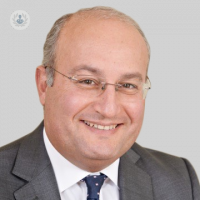Feeling dizzy: A guide to vertigo
Written by:The term vertigo, which means ‘dizziness’ or ‘sensation of whirling’ in Latin, is often mistaken for fear of heights. In reality, vertigo is the feeling that you or the world around you is spinning out of control.
These vertigo attacks can occur anywhere and at any time. The onset may be rapid, and they can last only a few seconds or much, much longer. In cases of severe vertigo, it has been known for symptoms to last continuously for up to several days. We speak to leading ENT specialist Mr Anthony Aymat all about it in this informative article.

Why does vertigo happen?
There are two types of vertigo: central and peripheral. Vertigo is not actually a condition in itself, but a symptom. What causes vertigo is commonly a problem with balance in the inner ear, but it can also be caused by problems in the brain. The type of vertigo generally depends on the cause. Common causes of vertigo include:
- Migraines
- Labyrinthitis - an infection of the inner ear
- Vestibular neuronitis - inflammation of the vestibular nerve which relays messages between the inner ear and brain in order to control balance
- Benign paroxysmal positional vertigo (BPPV) - when specific movements of the head trigger vertigo
- Ménière's disease
- Brain tumour
Additional symptoms may accompany vertigo, depending on what the root cause is. People may experience high temperature, hearing loss, or ringing in the ears (tinnitus).
What are the symptoms of vertigo?
Vertigo can be triggered by a change in the position of the head. The most common vertigo symptoms include:
- Dizziness
- Spinning sensation
- Tilting sensation
- Loss of balance
Other possible symptoms of vertigo are:
- Nausea;
- Vomiting;
- Headaches;
- Sweating;
Does vertigo have any risk factors?
There are a number of risk factors that can increase the chances of developing vertigo. In some cases, drinking alcohol can bring about vertigo. More common risk factors that can cause vertigo are head injuries, certain medications (such as antidepressants, anti-seizure and blood pressure medications and even aspirin).
Health conditions that increase your chance of having a stroke (high blood pressure, diabetes, and heart disease), can also increase the risk of developing vertigo.
How is vertigo treated?
Vertigo treatment can vary from case to case. Occasionally vertigo does improve over time, however some people, such as those with Ménière's disease, may experience repeated bouts of vertigo for months on end.
How vertigo is treated also depends on what is causing it. For example, in order to treat BPPV, a series of simple head movements known as the Epley manoeuvre can suffice. Certain medications such as certain antihistamines and Prochlorperazine have also been known to alleviate early vertigo symptoms.
Some people also benefit from vestibular rehabilitation, which is an exercise program designed for people who suffer from dizziness and balance problems.
If you're looking for expert vertigo treatment in Essex or London, visit Mr Aymat's Top Doctors profile to arrange an appointment.


